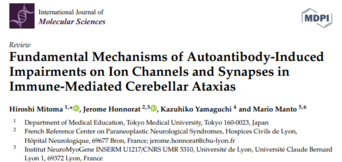Fundamental mechanisms of autoantibody-induced...
In the last years, different kinds of limbic encephalitis associated with autoantibodies against ion channels and synaptic receptors have been described. Many studies have demonstrated that such autoantibodies induce channel or receptor dysfunction. The same mechanism is discussed in immune-mediated cerebellar ataxias (IMCAs), but the pathogenesis has been less investigated. Consistently, the association of CAs with anti-potassium channel-related proteins, anti-VGCC, anti-mGluR1, and GluRδ, and anti-glutamate decarboxylase 65 antibodies is observed in IMCAs.
Despite ample distributions of AMPA and GABA receptors, however, CAs are rare in conditions with autoantibodies against these receptors. This physiopathological categorization impacts on both our understanding of the pathophysiology and clinical prognosis.




